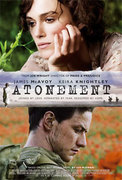Pete Hoskin
 At yesterday’s low-key Golden Globes ceremony, the British film ‘Atonement’ was named the Best Dramatic Motion Picture of the year; making it the front-runner for the “Best Picture” Oscar next month.
At yesterday’s low-key Golden Globes ceremony, the British film ‘Atonement’ was named the Best Dramatic Motion Picture of the year; making it the front-runner for the “Best Picture” Oscar next month.
Thankfully – and thanks should go to the Writers’ Guild of America – we were spared acceptance speeches yesterday. This meant that there were none of the typical British histrionics that accompany any major film awards win (see Colin Welland and his exclamation that “The British are coming!” at the 1981 Academy Awards). There’s no doubt, though, that Welland’s sentiment will be repeated – as it is almost every year – in the run-up to this year’s Oscars.
The things is, ‘Atonement’ is exactly the kind of film that we shouldn’t want to adulate, nor should we want it to be representative of the British film industry. It is devoid of any true emotional resonance (an opinion I share with the Spectator’s own Deborah Ross and Stephen Pollard); any social insight; or any innovation. Above all, ‘Atonement’ is safe – it is competent in every regard but lacks the urgency of great art.
Awards success for ‘Atonement’ could consign the British film industry to many more years of (artistic) mediocrity. British producers will pour their effort into period pieces (and that other stock favourite – the rom-com) with renewed vigour. And, as always, the true innovators of British cinema will be swamped. Our attention should be with the films which develop the language of cinema just as they develop our perceptions of Britain: the films of artists such as Lindsay Anderson, Derek Jarman, Ken Russell and, more recently, Shane Meadows.
So what should have won Best Dramatic Picture yesterday? Paul Thomas Anderson’s ‘There Will be Blood’ is a staggering piece of poetry and one of the greatest films to come out of any film industry. It would have been a worthy winner.






Comments